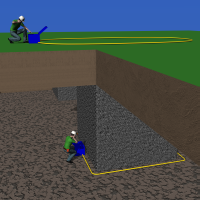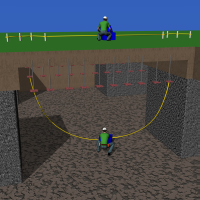Mining Feature: Through-the-earth Communications Technologies Available
Tuesday, September 1, 2015
The ground shakes, machinery stops, a distant rumbling is heard, then silence. A mine worker picks up the mine phone, but it’s dead. This predicament, where a mine fire, explosion, or other major event in a coal mine knocks out regular communications, can easily lead to tragedy. The mine workers are in danger until they can communicate with rescuers on the surface, but the emergency communication must pass through the earth (TTE), which regular radio transmissions cannot do.
The Mine Improvement and New Emergency Response Act of 2006 (MINER Act) requires that underground coal mines develop emergency response plans that specify two-way wireless communications and electronic tracking systems. TTE communications are one aspect of these plans, but no suitable through-the-earth technologies existed when the MINER Act was enacted.
NIOSH tackled this difficult technical problem by requesting innovative solutions through a Broad Agency Announcement (BAA). As a result, two TTE communications systems that were developed with NIOSH’s support have recently been made available, Lockheed-Martin’s Magnelink system and E-Spectrum’s Rescue Dog system.
Lockeed Martin’s Magnelink, TTE system uses a pair of loop antennas, one at the surface, and one within the mine. Communications occur via magnetic energy that is transmitted and received by the two antennas. E-Spectrum’s Rescue Dog TTE system uses a pair of linear antennas anchored to the earth. Signals are sent through an electric field between the two antennas. Antennas can be anchored using ground rods or existing features such as fully cased boreholes and roof bolts. See Table 1 below for characteristics of both systems.
Table 1: Through-the-earth system characteristics of the Magnelink and Rescue Dog systems
| TTE System Characteristics | Lockeed Martin’s Magnelink | E-Spectrum’s Rescue Dog |
|---|---|---|
|
Mode of communication |
Free form text and voice |
Canned text messages only |
|
Antenna configuration |
Loop wires |
Linear wires anchored to ground |
|
Transmission method |
Magnetic waves |
Electric field |
|
Operational frequencies bands |
Ultra low frequency (ULF) |
Extremely low frequency (ELF) |
|
Underground unit weight |
Several hundred lbs |
Under 100 lbs |
These systems can now be used to ensure that mine workers are able to communicate with rescuers on the surface in the event of a mine emergency.
The following links provide further information about the development of these new systems:
Mining Publication: Through-the-Earth, Post-Accident Communications-an Emerging Technology
Mining Contract: Through-The-Earth Wireless Real-Time Two-Way Voice Communications
Mining Contract: Through-the-Earth Communications System for Underground Coal Mines
- Adaptive-Noise-Cancellation Techniques for Through-the-Earth Electromagnetics: Volume III
- Cableless Electronic Surveying Systems for Horizontal Holes
- Clay Veins: Their Occurrence, Characteristics, and Support
- Demonstration of Remote Mine Seal Construction
- One-Way Fire Warning Alarm System for Underground Mines
- Through-the-Earth Communication Antenna Feasibility Demonstration
- Through-The-Earth Wireless Real-Time Two-Way Voice Communications
- Two-Way, Through-the-Earth Emergency Communication System for Trapped Miners and the Surface
- Ultra-Low Frequency Through-the-Earth Communication Technology
- Zen and the Art of Rockbolting

